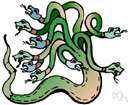hydra
(redirected from hydras)Also found in: Thesaurus, Medical, Encyclopedia.
Hy·dra
(hī′drə)n.
1. Greek Mythology The many-headed monster that was slain by Hercules.
2. Astronomy A satellite of Pluto.
3. A constellation in the equatorial region of the southern sky near Cancer, Libra, and Centaurus. Also called Snake2.
4. A persistent or multifaceted problem that cannot be eradicated by a single effort.
[Middle English Idra, from Latin Hydra, from Greek Hudrā, Hydra, a water serpent; see wed- in Indo-European roots.]
hy·dra
(hī′drə)n. pl. hy·dras or hy·drae (-drē)
Any of several small solitary freshwater hydrozoans of the genus Hydra and related genera, having a cylindrical body and a mouth surrounded by tentacles.
[New Latin Hydra, genus name, from Latin Hydra, Hydra; see Hydra.]
American Heritage® Dictionary of the English Language, Fifth Edition. Copyright © 2016 by Houghton Mifflin Harcourt Publishing Company. Published by Houghton Mifflin Harcourt Publishing Company. All rights reserved.
hydra
(ˈhaɪdrə)n, pl -dras or -drae (-driː)
1. (Animals) any solitary freshwater hydroid coelenterate of the genus Hydra, in which the body is a slender polyp with tentacles around the mouth
2. a persistent trouble or evil: the hydra of the Irish problem.
[C16: from Latin, from Greek hudra water serpent; compare otter]
Hydra
(ˈhaɪdrə)n
(Classical Myth & Legend) Greek myth a monster with nine heads, each of which, when struck off, was replaced by two new ones
Hydra
(ˈhaɪdrə)n, Latin genitive Hydrae (ˈhaɪdriː)
(Astronomy) a very long faint constellation lying mainly in the S hemisphere and extending from near Virgo to Cancer
Collins English Dictionary – Complete and Unabridged, 12th Edition 2014 © HarperCollins Publishers 1991, 1994, 1998, 2000, 2003, 2006, 2007, 2009, 2011, 2014
hy•dra
(ˈhaɪ drə)n., pl. -dras, -drae (-dri) for 1–3, gen. -drae (-dri) for 4.
1. (often cap.) a water monster of Greek myth having nine heads, each of which, if cut off, grew back as two.
2. any freshwater polyp of the family Hydridae, having a cylindrical body with a ring of tentacles surrounding the mouth.
3. a persistent or complex problem that presents new obstacles even as existing ones are overcome.
4. (cap.) the Sea Serpent, a southern constellation extending through 90° of the sky.
[1325–75; Middle English ydre < Middle French < Latin < Greek hýdrā water serpent; compare otter]
Random House Kernerman Webster's College Dictionary, © 2010 K Dictionaries Ltd. Copyright 2005, 1997, 1991 by Random House, Inc. All rights reserved.
hy·dra
(hī′drə) Any of several small freshwater polyps having a simple cylindrical body with a mouth-like opening surrounded by tentacles. The young develop from eggs or from buds.
The American Heritage® Student Science Dictionary, Second Edition. Copyright © 2014 by Houghton Mifflin Harcourt Publishing Company. Published by Houghton Mifflin Harcourt Publishing Company. All rights reserved.
ThesaurusAntonymsRelated WordsSynonymsLegend:
Switch to new thesaurus
| Noun | 1. |  Hydra - (Greek mythology) monster with nine heads; when struck off each head was replaced by two new ones; "Hydra was slain by Hercules" Hydra - (Greek mythology) monster with nine heads; when struck off each head was replaced by two new ones; "Hydra was slain by Hercules"Greek mythology - the mythology of the ancient Greeks mythical creature, mythical monster - a monster renowned in folklore and myth |
| 2. | Hydra - a long faint constellation in the southern hemisphere near the equator stretching between Virgo and Cancer | |
| 3. | hydra - trouble that cannot be overcome by a single effort because of its many aspects or its persistent and pervasive quality; "we may be facing a hydra that defies any easy solution" | |
| 4. | hydra - small tubular solitary freshwater hydrozoan polyp genus Hydra - hydras |
Based on WordNet 3.0, Farlex clipart collection. © 2003-2012 Princeton University, Farlex Inc.
Translations
Wasserschlange
Hydrahydre
Collins Spanish Dictionary - Complete and Unabridged 8th Edition 2005 © William Collins Sons & Co. Ltd. 1971, 1988 © HarperCollins Publishers 1992, 1993, 1996, 1997, 2000, 2003, 2005
hydra
n (Zool, Myth) → Hydra f
Collins German Dictionary – Complete and Unabridged 7th Edition 2005. © William Collins Sons & Co. Ltd. 1980 © HarperCollins Publishers 1991, 1997, 1999, 2004, 2005, 2007